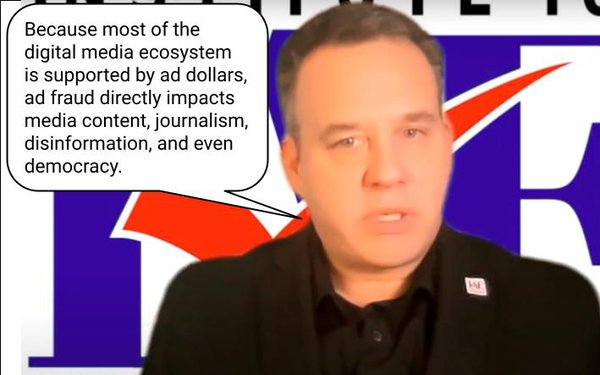
As part of a growing
ad-industry recognition that ad fraud isn’t just the illegal theft of marketers’ working media dollars, but also unethically funds nefarious parts of the media ecosystem, the Institute for
Advertising Ethics (IAE) is updating its professional certification program to include a new module focusing explicitly on fraud.
The module, which was developed in partnership with
the Alliance for Audited Media (AAM), is mainly educational and is designed to inform advertisers, agencies and others in the supply chain about the “serious ethical issues surrounding” ad
fraud in their media-buying decisions.
While the module has an emphasis on digital media -- including programmatic media-buying -- the IAE says the primary goal is to ensure people
are applying analytical thinking and judgment calls to the process, including how fraudulent media buys fund criminals, bogus publishers and misinformation, and various hostile actors.
advertisement
advertisement
“Whether it’s $1 or billions of dollars, ad fraud is an ethical issue marketers must acknowledge and act against,” said IAE COO Andrew Susman, adding: “Because most
of the digital media ecosystem is supported by ad dollars, ad fraud directly impacts media content, journalism, disinformation, and even democracy. This new module is an example of how IAE is
dedicated to ongoing education of industry practitioners.”
While the initial consequence of ad fraud frequently means a loss or misdirection of working media dollars, Susman
cited other unintended consequences that impact society-at-large, such as illegitimate publishers of misinformation about health and medical information that proliferated during the COVID-19
pandemic.
He said the module is especially important as the ad industry increasingly adopts programmatic, automated, and AI-based media-buying and decision-making processes in order
to manage their campaigns.
“Ad fraud and its ethical risks cannot be entirely delegated to software,” he said, adding, “In a similar way that content moderation
cannot be delegated to software, in that the software has no eyes.”
While ad fraud has been a persistent issue for the ad industry as long as advertising has existed, it has
become exacerbated by the shift to digital media -- and especially programmatic media-buying -- and has become a major concern of advertisers, agencies, as well as trade associations such as the
Association of National Advertisers and the American Association of Advertising Agencies in recent years.
Susman said the timing of the module had more to do with the fact that AAM
was on board to help develop it now, then any new trend of concerns about it. He said the goal of the IAE’s Certified Ethical Advertising Executive (CEAE) course has always been to evolve
as industry needs emerge.
The IAE, for example, has begun examining the ethical issues of advertisers, agencies and PR firms in so-called “greenwashing” of fossil fuel
brands, and is poised to hold the second of two symposiums to educate the industry on how to mitigate it, though it has not yet decided to add any component to the certification program.